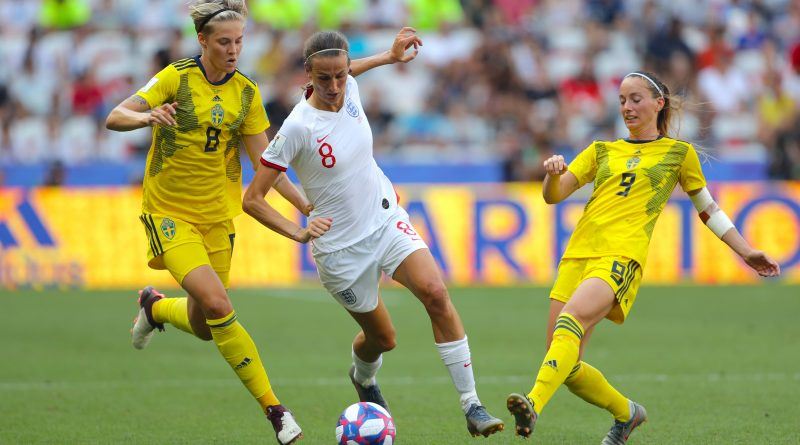“To see how much the game has grown is brilliant.” – Lionesses Fulwell born midfielder Jill Scott discusses the rapid rise in Women’s football

This year’s World Cup presented a significant shift in the landscape of the women’s game, with the fans gripped to their TV screens in the hope of an England team finally ‘bringing it home’ after decades of hurt.
It may have had a predictable English ending, as the side lost narrowly in the semi-finals to the USA, but the tournament finally provided the switch in mentality that many in the women’s game had waited far too long for.
The attention the game is currently receiving far outweighs all that has come before, and bringing with it the investment required to continue its growth from a grassroots level.
In Sunderland, however, they’ve been making strides in the women’s game for well over a decade, as evidenced by the success of the nation’s team that rested itself heavily on shoulders born and molded on Wearside, with Sunderland’s academy producing seven of England’s 2019 World Cup squad.
At the centre of the side stood Sunderland born midfielder Jill Scott, veteran of a remarkable 144 international caps.
“I used to love playing outside in the back lane. We had the recreation park where we could kick the ball around all day, and that’s exactly what we did!”
Born in a football obsessed region, among a family of divided loyalties, Scott never felt out of place being a girl who loved having a ball at her feet in Sunderland.
“Everybody loves sport in the North East and it was no different when I was young” she beams, recalling her early life in Fulwell. “I never felt like they thought anything about a girl being on the team, I think they respected the fact that I could play a bit”.
She also attributes the regions individual success to her former coach Mick Mulhern, who coaching a bulk of the world’s current best players, such as Scott’s Manchester City team-mate and England captain Steph Houghton, as well as World Silver Ball winner Lucy Bronze.
“When he first started Sunderland women, he really knew how to develop players, his coaching was very good and we were getting a good level of coaching at a young age which meant when you got picked for international camps, you weren’t behind on your knowledge.”
But whilst her region was on board with the women’s game, the bulk of the nation’s interest remained entrenched in the men’s game with male’s dominating the sport. A lack of investment in women’s football across all levels meant it was a struggle for those who sought a career in the sport to gain the relevant opportunities to continue their footballing education, and in turn help nurture the nation’s the best talent.
“One of the big changes I see [from her teenage years to now] is that when I was younger, the parents of the kids weren’t always able to make all the games, because you could only fit a maximum of five in a car! Nowadays it’s bus, more people can get to the games, and the parents are so much more involved”
However, the success of the World Cup in France means the 32-year-old is finally seeing the support she received in her native Sunderland on a wider scale, and she couldn’t be more delighted.
“There’s a lot more girls teams now. Some of those girls teams mix in and play against the boys team, but in all honesty, the interest in women’s football just means that the levels have gone up.
They are training more, the girls’ teams get to compete more as there’s more teams – that is producing some really good individual players.
There wasn’t the sort of numbers you see now back in the day. It just seems to get more popular year on year.
Participation levels are getting bigger and bigger, it’s more than doubled and it’s incredible.”
Scott, who has now played in eight major tournaments for her country, feels it’s not just at grassroots level that things are improving though, as she reveals those playing at the peak of the women’s game are benefiting from the extra focus on the women’s game is receiving.
“It’s more competitive, there are better individual players, so they go towards places like the centre of excellence and the levels are automatically higher.
Anything that happens at the top all comes from the bottom”.
Scott herself has taken the future of the women’s game into her own hands too, opening up soccer camps for girls aged 6-18.
“The first one I ever did only six girls turned up and I was debating if it was the right thing to do, even though we had a great three days with them, but the last one I did the numbers were up to 77!
“To see how much the game has grown like that is brilliant.
I ran several camps over the years, my schedule can get a little tight, but I want to make sure I am there and coaching and getting fully involved in. I don’t want to just be there at the end to hand out the trophies.”
Scott is hopeful the impact the summer had on the game is just the beginning of a bright future for the game, with her wish that one day “people want to take the kids to the ‘match’ at the weekend, instead of the ‘women’s football”.
And with the rapid speed the game is growing, paired with role models like Jill Scott actively working to make a difference, few would bet against her wishes becoming a reality in the near future.




